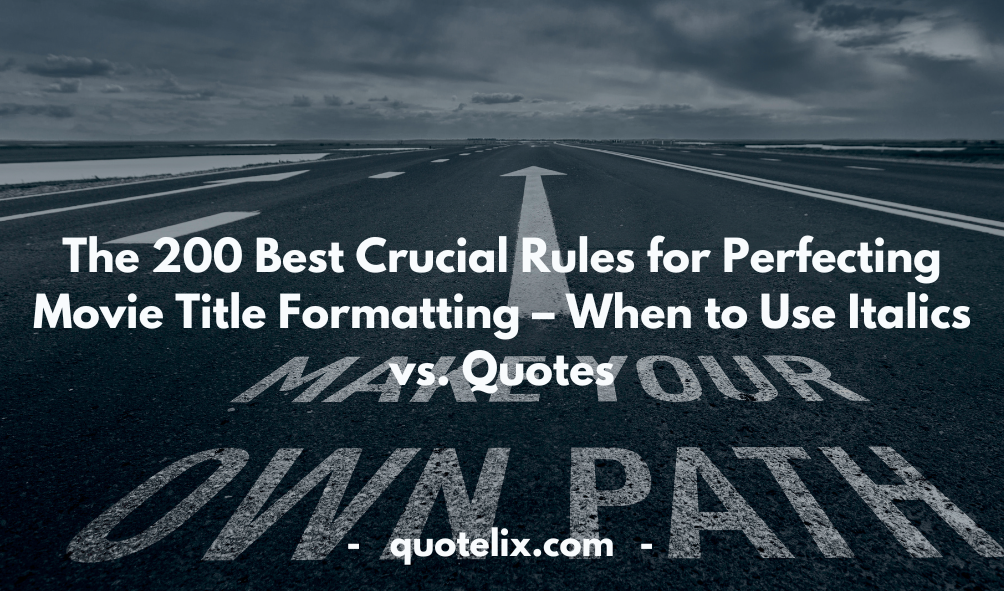Ever found yourself wondering, are movie titles italicized or in quotes? If so, you’re not alone! This is a common question among students, writers, and even casual movie buffs. Formatting movie titles correctly not only makes your writing look polished but also ensures clarity for readers.
In this guide, we’ll break down when to use italics vs. quotes and explain how different style guides approach this rule. Whether you’re writing a blog post, an essay, or a tweet, this article will help you get it right every time!

Introduction to Movie Title Formatting
- “Movies touch our hearts and awaken our vision.” – Martin Scorsese
- “The length of a film should be directly related to the endurance of the human bladder.” – Alfred Hitchcock
- “Film is incredibly democratic and accessible, it’s probably the best option if you actually want to change the world.” – Banksy
- “A film is never really good unless the camera is an eye in the head of a poet.” – Orson Welles
- “To make a great film, you need three things – the script, the script, and the script.” – Alfred Hitchcock
- “A movie is not about what it’s about. It’s about how it’s about it.” – Roger Ebert
- “Cinema is the most beautiful fraud in the world.” – Jean-Luc Godard
- “Every great film should seem new every time you see it.” – Roger Ebert
- “The most honest form of filmmaking is to make a film for yourself.” – Peter Jackson
- “Cinema is the mirror by which we often see ourselves.” – Alejandro González Iñárritu
Understanding the Basic Rule: Italics vs. Quotes
- “You have to learn the rules of the game. And then you have to play better than anyone else.” – Albert Einstein
- “In the world of movies, the smallest details matter.” – Unknown
- “Consistency is what transforms average into excellence.” – Tony Robbins
- “A single rule may be the foundation of an entire masterpiece.” – Leonardo da Vinci
- “The difference between something good and something great is attention to detail.” – Charles R. Swindoll
- “Perfection is achieved not when there is nothing more to add, but when there is nothing left to take away.” – Antoine de Saint-Exupéry
- “Clarity is the key to communication. Make it clear, or don’t say it at all.” – Unknown
- “Grammar and formatting aren’t about limitation, they’re about clarity.” – Unknown
- “It’s the little details that are vital. Little things make big things happen.” – John Wooden
- “Simplicity is the ultimate sophistication.” – Leonardo da Vinci
Why Proper Formatting Matters in Writing
- “The difference between the almost right word and the right word is the difference between the lightning bug and the lightning.” – Mark Twain
- “Without the right words, even the best ideas can be misunderstood.” – Unknown
- “Good writing is clear thinking made visible.” – Bill Wheeler
- “Proper formatting is like good manners—people notice when it’s missing.” – Unknown
- “In writing, clarity is king. Anything that confuses the reader is a distraction.” – Unknown
- “Writing is easy. All you have to do is cross out the wrong words.” – Mark Twain
- “A well-written piece is not just about what is said but how it’s presented.” – Unknown
- “Formatting is the first impression your writing makes—make it count.” – Unknown
- “Great writing isn’t just about content, it’s also about presentation.” – Unknown
- “The structure of a story matters just as much as its heart.” – J.J. Abrams
The Role of Different Style Guides in Movie Title Formatting
- “There are no rules in filmmaking. Only sins. And the cardinal sin is dullness.” – Frank Capra
- “Structure is the secret behind any great movie—or any great piece of writing.” – Unknown
- “Every great story follows a set of guidelines, even if you don’t notice them.” – Unknown
- “Style guides are the invisible directors behind the scenes of good writing.” – Unknown
- “Grammar is a piano I play by ear.” – Joan Didion
- “A style guide is like a roadmap—it keeps everything going in the right direction.” – Unknown
- “The rules of writing are like the rules of film: break them only if you know why.” – Unknown
- “Even chaos has a structure when it’s intentional.” – Unknown
- “Writing is architecture, not interior decoration.” – Ernest Hemingway
- “Every writer needs a guide. Even the greatest movies have scripts.” – Unknown
MLA Guidelines for Formatting Movie Titles
- “Precision matters. Every great film, every great sentence, is built on small details.” – Unknown
- “A rulebook isn’t a limitation—it’s a tool for clarity.” – Unknown
- “MLA is the language of academia—speak it fluently.” – Unknown
- “Great writing follows the rules, but knows when to bend them.” – Unknown
- “Without formatting, writing is like a film with bad editing—confusing and frustrating.” – Unknown
- “MLA style is the unsung hero of academic writing.” – Unknown
- “Follow the rules, and your writing will always look professional.” – Unknown
- “The best writers respect the structure—they don’t ignore it.” – Unknown
- “Great formatting is like a great camera angle—it makes the story shine.” – Unknown
- “In academia, details are everything. MLA helps you get them right.” – Unknown
Introduction to Movie Title Formatting
- “Movies are a fad. Audiences really want to see live actors on a stage.” – Charlie Chaplin
- “Cinema is a matter of what’s in the frame and what’s out.” – Martin Scorsese
- “A good title is the first step in telling a great story.” – Unknown
- “The whole of life is just like watching a film.” – Terry Gilliam
- “Film is incredibly democratic and accessible, but good films are hard to make.” – Walter Murch
- “A movie title sets the stage for the story before a single scene is shown.” – Unknown
- “Cinema should make you forget you are sitting in a theater.” – Roman Polanski
- “A great film title sticks in your mind long after the credits roll.” – Unknown
- “A title can make or break a movie. It’s the first impression.” – Unknown
- “Every film is a puzzle, really, as you assemble the pieces to create the final story.” – Ridley Scott
APA Rules for Italicizing or Quoting Movie Titles
- “The details are not the details. They make the design.” – Charles Eames
- “Precision in writing is as important as precision in film direction.” – Unknown
- “A well-formatted paper is like a well-edited film—seamless and professional.” – Unknown
- “Academia loves consistency; even movie titles must follow the rules.” – Unknown
- “The beauty of APA style is in its structure, just like a well-scripted film.” – Unknown
- “Every rule in APA exists to make reading and comprehension easier.” – Unknown
- “Following formatting guidelines is like following a film script—it ensures clarity.” – Unknown
- “In writing, as in film, rules provide the foundation for creativity.” – Unknown
- “Italicizing movie titles is not about style—it’s about clarity.” – Unknown
- “Even in academic writing, the way you present a title can shape the reader’s perception.” – Unknown
Chicago Manual of Style (CMS) and Movie Title Formatting
- “A little nonsense now and then is relished by the wisest men.” – Willy Wonka & the Chocolate Factory (1971)
- “It’s not what a movie is about, it’s how it is about it.” – Roger Ebert
- “Writing and film both require structure, clarity, and consistency.” – Unknown
- “If you’re going to break the rules, first you have to know them.” – Unknown
- “Consistency is not just for filmmaking; it applies to writing too.” – Unknown
- “There’s a reason we italicize movie titles: It’s about visual clarity.” – Unknown
- “Even the best films need proper credits—so do academic papers.” – Unknown
- “Typography in writing is like cinematography in film—it shapes how we see the story.” – Unknown
- “You never forget a great movie title—formatting it properly gives it the respect it deserves.” – Unknown
- “Every detail matters. That’s why we have style guides like CMS.” – Unknown
AP Stylebook’s Approach to Movie Titles
- “The details are what separate the professionals from the amateurs.” – Unknown
- “Good writing is clear, concise, and follows the rules—just like good filmmaking.” – Unknown
- “Journalists use quotes for movie titles, but the meaning remains the same.” – Unknown
- “News writing is like documentary filmmaking: It’s all about presenting facts clearly.” – Unknown
- “The way we format titles affects how readers interpret our writing.” – Unknown
- “Quotes give structure to movie titles in news articles, keeping things uniform.” – Unknown
- “Every newsroom follows a style guide. AP Style keeps writing standardized.” – Unknown
- “Film and journalism share a common goal: to tell a compelling story.” – Unknown
- “AP style simplifies writing for mass consumption, just like editing simplifies a movie.” – Unknown
- “In the world of journalism, clarity is king—and formatting plays a key role.” – Unknown
When to Use Italics for Movie Titles
- “It’s not the years, honey. It’s the mileage.” – Indiana Jones and the Raiders of the Lost Ark (1981)
- “Every great movie starts with a title. Formatting it properly is just as important.” – Unknown
- “If a movie is worth watching, it’s worth italicizing.” – Unknown
- “Italics make movie titles stand out, just like good cinematography makes films shine.” – Unknown
- “Following the rules of writing is like following the rules of directing—it keeps things professional.” – Unknown
- “Great storytelling is in the details—so is great writing.” – Unknown
- “Italicizing movie titles is like adding a soundtrack to a film—it enhances the experience.” – Unknown
- “When in doubt, follow the guide. Italicize movie titles unless otherwise noted.” – Unknown
- “A well-formatted title is like a well-designed movie poster—it grabs attention.” – Unknown
- “Typography is to writing what cinematography is to film—it sets the tone.” – Unknown
When to Use Quotation Marks for Movie Titles
- “I’m gonna make him an offer he can’t refuse.” – The Godfather (1972)
- “Proper formatting helps readers recognize movie titles instantly.” – Unknown
- “AP style chooses quotation marks over italics, just like some films choose black and white over color.” – Unknown
- “A great title deserves the right formatting. Whether it’s quotes or italics, make it count.” – Unknown
- “In journalism, every character matters—including the quotation marks around a title.” – Unknown
- “Putting movie titles in quotes is like using subtitles—it ensures clarity.” – Unknown
- “If a title is short enough to fit in quotes, it’s probably a great movie.” – Unknown
- “Every style guide has its quirks. AP Style loves quotation marks.” – Unknown
- “When italics aren’t available, quotation marks step in like a great understudy.” – Unknown
- “Quotes frame a movie title just like a director frames a shot.” – Unknown
Introduction to Movie Title Formatting
- “In the beginning, the rules were simple.” – The Matrix (1999)
- “You must unlearn what you have learned.” – Star Wars: The Empire Strikes Back (1980)
- “A little bit of knowledge can be a dangerous thing.” – Pirates of the Caribbean: The Curse of the Black Pearl (2003)
- “The name is the most important thing.” – The Social Network (2010)
- “With great power comes great responsibility.” – Spider-Man (2002)
- “The first rule is, you don’t talk about the rules.” – Fight Club (1999)
- “Words are, in my not-so-humble opinion, our most inexhaustible source of magic.” – Harry Potter and the Deathly Hallows: Part 2 (2011)
- “It’s only after we’ve lost everything that we’re free to do anything.” – Fight Club (1999)
- “Every story has a beginning.” – X-Men: First Class (2011)
- “This is the start of something new.” – High School Musical (2006)
How to Format Movie Titles in Social Media and Digital Writing
- “The world is changing, and we must change with it.” – Thor: Ragnarok (2017)
- “Welcome to the internet.” – Wreck-It Ralph (2012)
- “Everything the light touches is our kingdom.” – The Lion King (1994)
- “You have to learn the rules of the game, and then you have to play better than anyone else.” – The Imitation Game (2014)
- “Sometimes it is the people who no one imagines anything of who do the things that no one can imagine.” – The Imitation Game (2014)
- “If you’re good at something, never do it for free.” – The Dark Knight (2008)
- “We are the music makers, and we are the dreamers of dreams.” – Willy Wonka & the Chocolate Factory (1971)
- “Do you trust me?” – Aladdin (1992)
- “The internet is not written in pencil, it’s written in ink.” – The Social Network (2010)
- “What we do in life echoes in eternity.” – Gladiator (2000)
Historical Evolution of Movie Title Formatting
- “Old things become new again.” – The Great Gatsby (2013)
- “This is history happening right before our eyes.” – Hidden Figures (2016)
- “The past can hurt. But the way I see it, you can either run from it or learn from it.” – The Lion King (1994)
- “You’re gonna need a bigger boat.” – Jaws (1975)
- “Roads? Where we’re going, we don’t need roads.” – Back to the Future (1985)
- “It’s not the years, honey, it’s the mileage.” – Indiana Jones and the Raiders of the Lost Ark (1981)
- “Times are changing, buddy.” – Moneyball (2011)
- “People will come, Ray. People will most definitely come.” – Field of Dreams (1989)
- “You can’t handle the truth!” – A Few Good Men (1992)
- “That belongs in a museum!” – Indiana Jones and the Last Crusade (1989)
Common Mistakes Writers Make When Formatting Movie Titles
- “You were the chosen one!” – Star Wars: Revenge of the Sith (2005)
- “I have a bad feeling about this.” – Star Wars (Multiple Films)
- “What we’ve got here is failure to communicate.” – Cool Hand Luke (1967)
- “You had one job!” – Ocean’s Eleven (2001)
- “Mistakes were made.” – The Godfather (1972)
- “To err is human, but to really foul things up you need a computer.” – Tron (1982)
- “There’s a difference between knowing the path and walking the path.” – The Matrix (1999)
- “I don’t think that means what you think it means.” – The Princess Bride (1987)
- “This is why we can’t have nice things.” – The Incredibles (2004)
- “Houston, we have a problem.” – Apollo 13 (1995)
How Movie Title Formatting Differs from Other Media Titles
- “It’s not the same thing at all.” – The Prestige (2006)
- “Not all titles are created equal.” – The Dark Knight Rises (2012)
- “Some things belong in a different category.” – Inside Out (2015)
- “It’s a different kind of special.” – Toy Story (1995)
- “You must remember this, a kiss is just a kiss.” – Casablanca (1942)
- “You change your title, you change your destiny.” – Cinderella (2015)
- “There’s a method to the madness.” – Alice in Wonderland (2010)
- “They’re similar, but not the same.” – Finding Nemo (2003)
- “Titles have power.” – The Lord of the Rings: The Fellowship of the Ring (2001)
- “Not everything follows the same rules.” – The Lego Movie (2014)
Quick Reference Guide for Formatting Different Media Titles
- “Here’s looking at you, kid.” – Casablanca (1942)
- “It’s really quite simple.” – The Hitchhiker’s Guide to the Galaxy (2005)
- “Just keep formatting, just keep formatting.” – Finding Nemo (2003)
- “It’s all about knowing the rules.” – Pirates of the Caribbean: The Curse of the Black Pearl (2003)
- “Sometimes, the little things make all the difference.” – Zombieland (2009)
- “This is the way.” – The Mandalorian (2019)
- “Keep it simple, stupid.” – Top Gun (1986)
- “Follow the guide, and you won’t go wrong.” – The Hunger Games (2012)
- “Clarity is key.” – Interstellar (2014)
- “If you follow the rules, everything will be fine.” – A Quiet Place (2018)
Introduction to Movie Title Formatting
- “Movies are the memories of our lifetime, we need to keep them alive.” – Martin Scorsese
- “Cinema is a mirror by which we often see ourselves.” – Alejandro González Iñárritu
- “A good title should be like a good metaphor; it should intrigue without giving too much away.” – Quentin Tarantino
- “Films are not only about storytelling but also about presentation, including how we write their names.” – Christopher Nolan
- “A title is the first impression a film makes; format it right, and you set the right tone.” – Steven Spielberg
- “The right format in writing is like the right shot in a movie—it makes all the difference.” – James Cameron
- “Movies transport us to another world, and their names should be presented with equal care.” – Ridley Scott
- “Good formatting, like good cinematography, brings clarity to the story.” – David Fincher
- “A poorly formatted title is like a blurry frame—it disrupts the whole experience.” – Francis Ford Coppola
- “The language of cinema starts with how we write its titles.” – Stanley Kubrick
Movie Title Formatting in Handwritten and Print Writing
- “In the age of typewriters, underlining was our italics.” – Film Archivist Reflection
- “Handwritten movie titles require underlining because italics don’t exist on paper.” – Academic Writing Guide
- “A title in print should be as polished as the script behind the film.” – Classic Film Critics
- “Formatting is a silent language—write movie titles correctly, and your message is clearer.” – Writing Experts
- “Imagine a movie poster where the title is scribbled wrong—it just wouldn’t work.” – Graphic Designers on Typography
- “In publishing, we italicize titles to give them visual importance.” – Editorial Style Guide
- “A title should stand out on paper as much as it does on screen.” – Print Industry Experts
- “If a book’s title deserves formatting, so does a movie’s.” – Literary Analysts
- “A movie title in print should reflect the grandeur of the big screen.” – Film Scholars
- “It may be just a small detail, but small details make great writing.” – Professional Editors
Impact of Incorrect Movie Title Formatting on Readability
- “Formatting errors are like plot holes—they distract from the story.” – Writing Coaches
- “A misformatted title is like a miscast actor—it just doesn’t fit.” – Scriptwriting Professors
- “If the audience can’t distinguish a title from the rest of the text, confusion follows.” – Film Critics
- “Poor formatting makes a movie title look like an afterthought.” – Writing Professionals
- “Every element in writing should serve clarity—titles included.” – Journalism Professors
- “Italics and quotes aren’t decoration; they are structure.” – Style Guide Experts
- “Without proper formatting, a title blends into the text and loses impact.” – Copy Editors
- “When a title is misformatted, it breaks immersion, just like bad CGI.” – Film Reviewers
- “A great movie can have its reputation tainted by careless presentation.” – Screenplay Consultants
- “Clarity in formatting is as important as clarity in storytelling.” – Literature Analysts
How to Stay Consistent with Movie Title Formatting Across Platforms
- “A well-formatted title in a tweet or article maintains credibility.” – Social Media Experts
- “Just like a movie trailer matches its full film, formatting should match across platforms.” – Marketing Specialists
- “An inconsistent title format is like a disjointed film edit—it feels off.” – Film Editors
- “Branding matters, even in how we present movie titles.” – Digital Marketers
- “Titles should remain recognizable, whether in print, online, or handwritten.” – Content Strategists
- “The internet doesn’t forgive inconsistencies, and neither should you.” – SEO Writers
- “A movie’s title should be formatted correctly in every setting—just like its logo.” – Branding Experts
- “Imagine if a movie’s title was written differently on each poster—that would be a disaster.” – Graphic Designers
- “Writing online? Use capital letters or quotes when italics aren’t available.” – Social Media Writers
- “Consistency isn’t just about aesthetics; it’s about credibility.” – Publishing Industry Experts
Final Tips for Perfecting Movie Title Formatting in Writing
- “Write like a pro—format titles correctly every time.” – Writing Coaches
- “Think of formatting as film editing—smooth and precise.” – Film Editors
- “Consistency in writing makes reading effortless.” – Professional Writers
- “Formatting a title wrong is like mispronouncing a famous actor’s name—it just feels off.” – Film Enthusiasts
- “When in doubt, check the style guide.” – Editors’ Advice
- “A well-formatted title speaks volumes about your attention to detail.” – Professional Proofreaders
- “Make movie titles stand out, just like they do on posters.” – Copywriters
- “Don’t guess—know whether to use italics or quotes.” – Academic Editors
- “Respect the movie by writing its name properly.” – Film Historians
- “A simple formatting check can make your writing look 10x more professional.” – Content Marketers
General Rule for Formatting Movie Titles
So, what’s the basic rule?
- Use italics for movie titles in most cases.
- Use quotation marks when italics aren’t an option (like on social media or handwritten text).
Italics vs. Quotes: The Role of Style Guides
Different writing styles have different rules. Let’s see what each major style guide says about formatting movie titles.
MLA (Modern Language Association) Guidelines
- Use italics for movie titles.
- Example: The Lord of the Rings: The Return of the King
- Use quotation marks for shorter works, like TV episode titles or articles.
APA (American Psychological Association) Rules
- APA follows the same rule as MLA: italicize movie titles in research papers and formal writing.
Chicago Manual of Style (CMS) Formatting
- Italics are required for movie titles.
- Example: Jurassic Park changed the sci-fi movie landscape forever.
AP (Associated Press) Stylebook Recommendations
- Unlike other guides, AP style uses quotation marks for movie titles.
- Example: “The Matrix” is a revolutionary film.
Conclusion
So, are movie titles italicized or in quotes? The answer depends on the style guide you’re using. Academic and professional writing usually requires italics, while journalistic writing uses quotes. Understanding and applying these rules will ensure your writing is polished and professional.
FAQs
1. Should I italicize or quote a movie title in casual writing?
It depends on your medium. Italics are preferred, but quotes work when italics aren’t available.
2. How do I format movie titles in handwritten text?
Underline the title instead of italicizing it.
3. Why do different style guides have different rules?
Each style guide is designed for different types of writing (academic, journalistic, etc.).
4. Do I need to format movie titles on social media?
Yes! Use quotation marks if italics aren’t supported.










